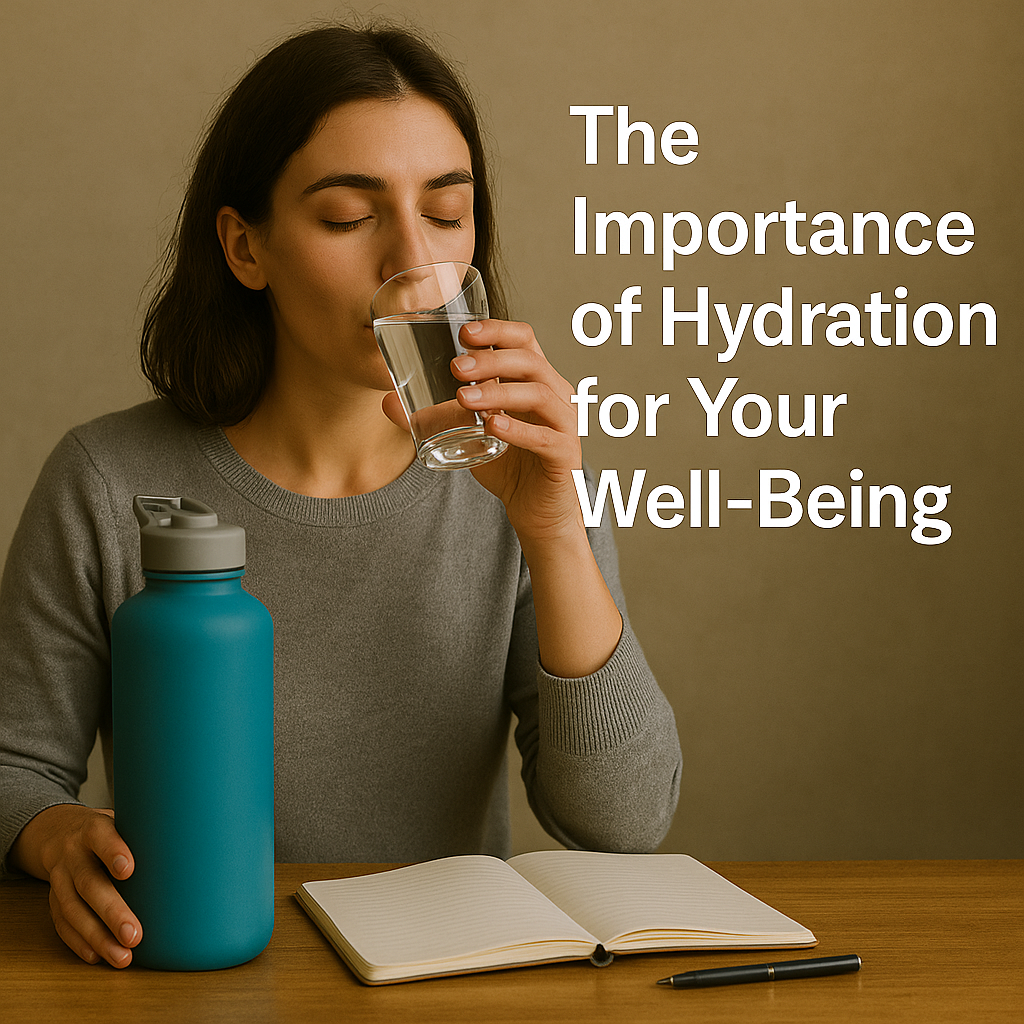Water makes up more than half of your body weight. It’s involved in every function your body performs—from regulating temperature and transporting nutrients, to lubricating joints and supporting cognitive function.
Yet despite how essential it is, many people go through their days mildly dehydrated, leading to fatigue, headaches, and decreased focus—often without even realizing water is the missing link.
In this article, we’ll explore why hydration is so important, how much water you really need, and practical tips to help you stay consistently hydrated without overthinking it.
Why Your Body Needs Water
Water isn’t just something you drink—it’s a vital nutrient that your body depends on for survival.
Key functions of water in the body:
- Regulates body temperature through sweat
- Carries oxygen and nutrients to cells
- Flushes toxins through urine
- Protects organs and tissues
- Aids digestion and nutrient absorption
- Supports brain function and mood
Even mild dehydration can impair physical and mental performance.
Signs of Dehydration (That Most People Miss)
You don’t have to be thirsty to be dehydrated. Many symptoms we blame on “stress” or “fatigue” are actually due to low fluid intake.
Common signs:
- Headaches or dizziness
- Dry mouth or chapped lips
- Muscle cramps or joint pain
- Trouble concentrating
- Irritability or brain fog
- Constipation
- Dark yellow or low-volume urine
If you notice any of these regularly, try increasing your water intake first—it might make a big difference.
How Much Water Do You Really Need?
The classic advice is to drink “8 glasses a day,” but needs vary based on your body, activity level, climate, and diet.
A general guideline:
- Women: 2.7 liters/day (about 91 oz)
- Men: 3.7 liters/day (about 125 oz)
This includes all fluids—from water, food, and other beverages. If you’re physically active, live in a hot climate, or are pregnant/breastfeeding, you may need more.
Best Sources of Hydration
1. Water (obviously)
Plain water is the most efficient and calorie-free way to hydrate.
2. Infused Water
Add lemon, cucumber, berries, or mint for flavor without sugar.
3. Herbal Teas
Chamomile, mint, or hibiscus teas are hydrating and soothing.
4. Water-Rich Foods
Fruits and vegetables like watermelon, cucumber, oranges, lettuce, and celery add to your hydration.
5. Electrolyte Drinks (in moderation)
If you sweat heavily or exercise intensely, consider a low-sugar electrolyte drink to restore balance.
Tips to Stay Hydrated Throughout the Day
1. Start Your Morning With Water
Drink a full glass of water after waking up to rehydrate your body and jumpstart metabolism.
2. Carry a Reusable Water Bottle
Make it a habit to have water with you at all times. Reaching for it becomes automatic.
3. Set Hourly Reminders
Use a phone alarm or hydration app to remind you to sip regularly.
4. Drink Before You’re Thirsty
Thirst is a late sign of dehydration. Don’t wait for it to hit—stay ahead of it.
5. Balance Caffeine and Alcohol
Both are diuretics, which can dehydrate you. For every cup of coffee or glass of wine, drink a glass of water too.
6. Add a Splash of Flavor
If plain water is boring, try infused waters or a splash of citrus juice.
7. Eat Hydrating Foods
Include water-dense fruits and veggies in every meal or snack.
Hydration and Energy Levels
Fatigue is often the first sign of dehydration. When you’re low on water, your blood volume decreases, making your heart work harder to deliver oxygen and nutrients. This leads to sluggishness and reduced alertness.
Staying hydrated:
- Improves endurance
- Boosts mental clarity
- Enhances mood
- Helps prevent afternoon crashes
If you’re dragging by 3 p.m., try a glass of water before reaching for caffeine.
Hydration for Skin Health
Your skin is the largest organ in your body—and it reflects your internal hydration.
Proper hydration can:
- Improve skin elasticity
- Reduce the appearance of dryness and dullness
- Minimize acne breakouts
- Enhance natural glow
While water alone won’t replace a full skincare routine, it’s a crucial piece of the puzzle.
What About Overhydration?
While rare, drinking too much water too quickly (especially without electrolytes) can lead to hyponatremia—a condition where sodium levels in the blood drop dangerously low.
To avoid this:
- Sip throughout the day instead of chugging large amounts
- Balance water with electrolytes if you’re sweating a lot
- Listen to your body—hydration should never make you feel bloated or nauseous
Final Thoughts: Small Sips, Big Impact
Hydration doesn’t have to be a chore. It’s one of the simplest, most effective habits you can build for better energy, focus, digestion, and mood.
Start by:
- Drinking a glass of water first thing in the morning
- Keeping water visible and within reach
- Being mindful of how you feel throughout the day
Over time, drinking enough water will stop feeling like a task—and start feeling like an act of self-care.
You don’t need to aim for perfection. Just a few more sips, a few more mindful choices—and your body will thank you.

